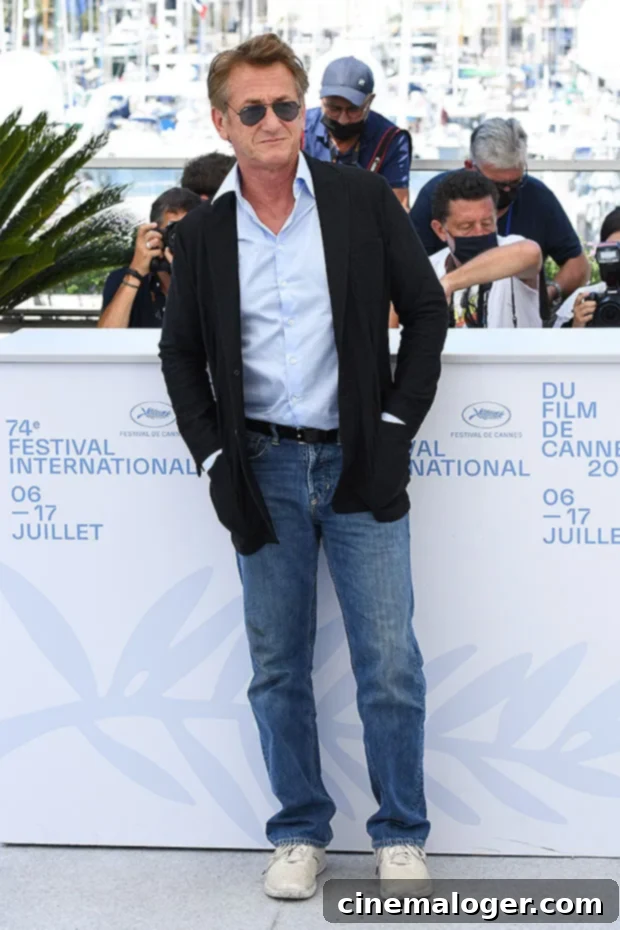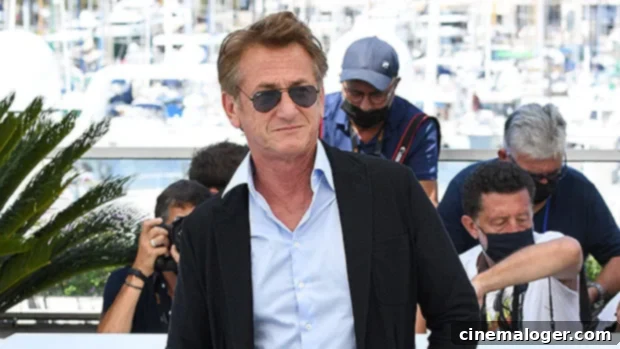Sean Penn Vows Oscars Boycott if Zelenskyy is Excluded: A Stirring Call for Global Awareness
In an extraordinary and impassioned declaration that has sent ripples through Hollywood and beyond, acclaimed actor and humanitarian Sean Penn, 61, has openly stated his intention to boycott the upcoming Academy Awards. His radical decision hinges on whether the ceremony’s organizers choose to exclude Ukrainian President Volodymyr Zelenskyy from making an appearance. This powerful stance, revealed in a new interview with CNN’s Jeff Acosta, underscores Penn’s deep conviction that the prestigious event must leverage its global platform to address the urgent humanitarian crisis unfolding in Ukraine.
Penn’s interview, conducted remotely from war-torn Ukraine, offered a stark backdrop to his compelling arguments. He passionately articulated his belief that granting President Zelenskyy the opportunity to speak at the Oscars is not merely an act of solidarity but a moral imperative. “There is nothing greater that the Academy Awards could do than give him the opportunity to talk to us,” Penn asserted, highlighting the unparalleled reach and influence of the Oscars as a global cultural event. His words resonate with a growing sentiment that in times of crisis, the entertainment world cannot remain insulated from global affairs, especially when such significant platforms can be utilized for impactful advocacy.

The conversation with Jeff Acosta initially prompted Penn to delve into the potential significance of a Zelenskyy appearance, particularly given the Ukrainian President’s own background. Penn emphasized that Zelenskyy, a former actor and comedian, possesses a unique understanding of the entertainment industry and the power of communication, making him an exceptionally relevant voice for such an event. His journey from a television personality to a wartime leader has captivated the world, demonstrating an extraordinary blend of resilience and charisma. This history, Penn argued, would allow Zelenskyy to connect with the Hollywood audience and a worldwide viewership on a profoundly personal and impactful level.
However, Penn’s earnest appeal quickly turned to grave concern. He expressed his apprehension that “the decision has been made” to forgo Zelenskyy’s appearance, although he candidly admitted he wasn’t certain whether this was a choice made by the Academy’s organizers or by President Zelenskyy himself, possibly due to pressing duties on the ground. Despite this ambiguity, the prospect of such an exclusion deeply troubled Penn, leading him to ponder the implications of Hollywood potentially missing a monumental opportunity to stand in unequivocal solidarity with a nation under siege. The idea that a platform as influential as the Oscars might shy away from such a critical humanitarian moment seemed, to Penn, an incomprehensible misstep.
While Sean Penn acknowledged his lack of direct insight into the closed-door discussions surrounding the decision, his condemnation of a potential exclusion was unflinching. He passionately voiced his strong feelings about the scenario where the Academy or individual presenters might choose not to include President Zelenskyy in the prestigious ceremony. Penn did not mince words, articulating a powerful warning: “If the Academy has elected not to do it, if the presenters have elected not to pursue the leadership in Ukraine who are taking bullets and bombs for us, along with the Ukrainian children that they are trying to protect, then I think every single one of those people and every bit of that decision will have been the most obscene moment in Hollywood history.”
This dramatic statement underscores the weight Penn places on Hollywood’s moral responsibility. For him, the global conflict transcends mere politics; it represents a fundamental struggle for freedom and human dignity, with Ukraine’s leaders and citizens enduring unimaginable sacrifices. He believes that ignoring this struggle, especially when offered a direct channel to a global audience, would constitute an egregious failure of conscience. Penn further implored, “I pray there have not been arrogant people who consider themselves representatives of the greater good in my industry that have not decided to check in with leadership in Ukraine.” His words served as both a heartfelt plea and a stark challenge to the industry he has been a part of for decades, urging it to prioritize human solidarity over perceived neutrality or entertainment-centric concerns.
Taking his stance a significant step further, Sean Penn announced his concrete plan to boycott the Academy Awards should he confirm that a decision was made to exclude President Zelenskyy. More than just a personal act of protest, Penn emphatically urged fellow attendees and nominees to follow suit. “I hope that’s not what’s happened and I hope everyone walks out if it is,” he declared, amplifying his call for collective action. He elaborated on his appeal, stating, “I would encourage everyone involved [in the Oscars] to know that though it may be their moment to celebrate their films, it is so much more importantly their time to protest and boycott that Academy Awards.”
Penn’s proposed boycott is not just a symbolic gesture; it’s a direct challenge to the establishment. To illustrate the depth of his conviction, he even went as far as to vow to destroy his own two coveted Academy Awards. These accolades, earned for his powerful performances in the critically acclaimed films Mystic River in 2003 and Milk in 2008, represent the pinnacle of his professional achievement. The idea of him destroying these symbols of his success profoundly highlights the gravity of the situation in his eyes, suggesting that no personal achievement is more important than standing up for humanitarian principles. This extreme pledge serves as a potent reminder of the moral stakes involved, urging the industry to consider the broader impact of its decisions on a world grappling with immense suffering.
Sean Penn’s vocal advocacy for Ukraine is not a recent development. Since the onset of the crisis several months ago, he has been courageously on the ground in Ukraine, dedicating his efforts to documenting the unfolding chaos, as well as capturing the remarkable bravery and indomitable perseverance of the Ukrainian people struggling amidst unimaginable adversity. His presence there is part of a documentary film project aimed at bringing the lived realities of the conflict to a global audience, demonstrating a profound commitment that extends far beyond mere celebrity endorsement.
His experiences in the country have been raw and often perilous. Penn has openly shared challenging moments with his fans, including one instance where he and his crew were forced to abandon their car and walk for miles to reach the safety of the Polish border. This firsthand engagement with the realities of war underscores his profound empathy and unwavering dedication to the cause. Penn has not only committed his own time and resources but has also actively rallied his peers, urging fellow celebrities to join in supporting Ukraine and its resilient President. He stands alongside other prominent figures such as Mila Kunis, Ashton Kutcher, and Maksim Chmerkovskiy, who have utilized their platforms to raise awareness and vital funds, collectively amplifying the message of support for a nation in dire need.
The debate surrounding politics and entertainment is as old as Hollywood itself. While some argue that awards ceremonies should remain sanctuaries of artistic celebration, insulated from the contentious currents of global politics, Sean Penn and a growing number of industry figures fiercely contend otherwise. They posit that with immense power comes immense responsibility, and few platforms command as much global attention as the Academy Awards. To use such a stage to highlight a critical humanitarian crisis, to give voice to a leader fighting for his nation’s survival, is seen by many as not just acceptable but morally imperative.
President Zelenskyy’s background as an entertainer offers a unique bridge between these two worlds. His ability to communicate, to inspire, and to convey powerful messages has been crucial in rallying international support for Ukraine. Denying him a platform like the Oscars could be interpreted as a missed opportunity not only for global awareness but also for the Academy to demonstrate its relevance and moral standing in a rapidly changing world. The “cultural vicinity” of the Oscars extends far beyond the red carpet; it touches millions of homes globally, making it a powerful conduit for important messages.
Ultimately, Sean Penn’s bold ultimatum casts a long shadow over the upcoming Academy Awards. His willingness to sacrifice personal accolades and challenge the status quo highlights a deeper conflict within Hollywood: what role should it play in times of global crisis? His call for a boycott, and his dramatic vow regarding his own Oscars, serve as a potent reminder that for some, the glitz and glamour of awards season pale in comparison to the urgent need for solidarity and action on the world stage. Whether the Academy yields to this pressure, or stands firm on a decision for exclusion, the debate initiated by Penn has already ensured that the intersection of art, politics, and humanitarianism will be a central talking point long after the last award is handed out.
